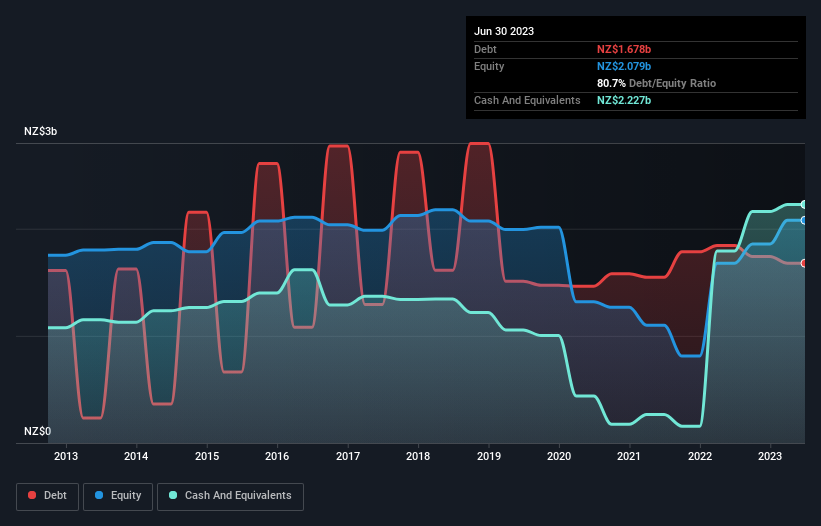
Warren Buffett famously said, 'Volatility is far from synonymous with risk.' It's only natural to consider a company's balance sheet when you examine how risky it is, since debt is often involved when a business collapses. We note that Air New Zealand Limited (NZSE:AIR) does have debt on its balance sheet. But the real question is whether this debt is making the company risky.
When Is Debt Dangerous?
Generally speaking, debt only becomes a real problem when a company can't easily pay it off, either by raising capital or with its own cash flow. If things get really bad, the lenders can take control of the business. However, a more frequent (but still costly) occurrence is where a company must issue shares at bargain-basement prices, permanently diluting shareholders, just to shore up its balance sheet. By replacing dilution, though, debt can be an extremely good tool for businesses that need capital to invest in growth at high rates of return. The first thing to do when considering how much debt a business uses is to look at its cash and debt together.
See our latest analysis for Air New Zealand
What Is Air New Zealand's Debt?
As you can see below, Air New Zealand had NZ$1.68b of debt at June 2023, down from NZ$1.84b a year prior. However, its balance sheet shows it holds NZ$2.23b in cash, so it actually has NZ$549.0m net cash.

How Strong Is Air New Zealand's Balance Sheet?
We can see from the most recent balance sheet that Air New Zealand had liabilities of NZ$3.84b falling due within a year, and liabilities of NZ$3.28b due beyond that. On the other hand, it had cash of NZ$2.23b and NZ$444.0m worth of receivables due within a year. So its liabilities outweigh the sum of its cash and (near-term) receivables by NZ$4.45b.
This deficit casts a shadow over the NZ$2.63b company, like a colossus towering over mere mortals. So we'd watch its balance sheet closely, without a doubt. After all, Air New Zealand would likely require a major re-capitalisation if it had to pay its creditors today. Air New Zealand boasts net cash, so it's fair to say it does not have a heavy debt load, even if it does have very significant liabilities, in total.
Although Air New Zealand made a loss at the EBIT level, last year, it was also good to see that it generated NZ$587m in EBIT over the last twelve months. When analysing debt levels, the balance sheet is the obvious place to start. But ultimately the future profitability of the business will decide if Air New Zealand can strengthen its balance sheet over time. So if you're focused on the future you can check out this free report showing analyst profit forecasts.
But our final consideration is also important, because a company cannot pay debt with paper profits; it needs cold hard cash. Air New Zealand may have net cash on the balance sheet, but it is still interesting to look at how well the business converts its earnings before interest and tax (EBIT) to free cash flow, because that will influence both its need for, and its capacity to manage debt. Over the last year, Air New Zealand actually produced more free cash flow than EBIT. That sort of strong cash conversion gets us as excited as the crowd when the beat drops at a Daft Punk concert.
Summing Up
While Air New Zealand does have more liabilities than liquid assets, it also has net cash of NZ$549.0m. And it impressed us with free cash flow of NZ$1.3b, being 213% of its EBIT. So while Air New Zealand does not have a great balance sheet, it's certainly not too bad. There's no doubt that we learn most about debt from the balance sheet. But ultimately, every company can contain risks that exist outside of the balance sheet. For example, we've discovered 1 warning sign for Air New Zealand that you should be aware of before investing here.
If, after all that, you're more interested in a fast growing company with a rock-solid balance sheet, then check out our list of net cash growth stocks without delay.
New: Manage All Your Stock Portfolios in One Place
We've created the ultimate portfolio companion for stock investors, and it's free.
• Connect an unlimited number of Portfolios and see your total in one currency
• Be alerted to new Warning Signs or Risks via email or mobile
• Track the Fair Value of your stocks
Have feedback on this article? Concerned about the content? Get in touch with us directly. Alternatively, email editorial-team (at) simplywallst.com.
This article by Simply Wall St is general in nature. We provide commentary based on historical data and analyst forecasts only using an unbiased methodology and our articles are not intended to be financial advice. It does not constitute a recommendation to buy or sell any stock, and does not take account of your objectives, or your financial situation. We aim to bring you long-term focused analysis driven by fundamental data. Note that our analysis may not factor in the latest price-sensitive company announcements or qualitative material. Simply Wall St has no position in any stocks mentioned.
About NZSE:AIR
Air New Zealand
Provides air passenger and cargo transportation on scheduled airlines services in New Zealand, Australia, the Pacific Islands, Asia, the United Kingdom, Europe, and the Americas.
Adequate balance sheet second-rate dividend payer.
Similar Companies
Market Insights
Community Narratives



